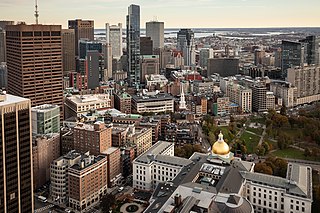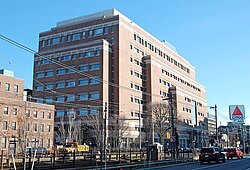The Walter A. Haas School of Business, also known as Berkeley Haas, is the business school of the University of California, Berkeley, a public research university in Berkeley, California. It was the first business school at a public university in the United States and is ranked among the best business schools in the world by The Economist, Financial Times, QS World University Rankings, U.S. News & World Report, and Bloomberg Businessweek.



The Schulich School of Business is the business school of York University located in Toronto, Ontario, Canada. The institution provides undergraduate and graduate degree and diploma programs in business administration, finance, accounting, business analytics, public administration and international business as well as a number of PhD and executive programs. Originally known as the Faculty of Administrative Studies (FAS), it was renamed in 1995 after Seymour Schulich, a major benefactor who has donated $15 million to the school. The Dean of the School, Detlev Zwick, was appointed in 2021 after having served as Interim Dean for 15 months.
The Samuel Curtis Johnson Graduate School of Management is the graduate business school in the SC Johnson College of Business at Cornell University, a private Ivy League university located in Ithaca, New York. It was founded in 1946 and renamed in 1984 after Samuel Curtis Johnson, founder of S.C. Johnson & Son, following his family's $20 million endowment gift to the school in his honor—at the time, the largest gift to any business school in the world.

The Yale School of Management is the graduate business school of Yale University, a private research university in New Haven, Connecticut. The school awards the Master of Business Administration (MBA), MBA for Executives (EMBA), Master of Advanced Management (MAM), Master's Degree in Systemic Risk (SR), Master's Degree in Global Business & Society (GBS), Master's Degree in Asset Management (AM), and Ph.D. degrees, as well as joint degrees with nine other graduate programs at Yale University.
The McCombs School of Business is a business school at The University of Texas at Austin, a public research university in Austin, Texas. In addition to the main campus in Downtown Austin, McCombs offers classes outside Central Texas in Dallas, and Houston. The McCombs School of Business offers undergraduate, master's, and doctoral programs for their average 13,000 students each year, adding to its 98,648 member alumni base from a variety of business fields. In addition to traditional classroom degree programs, McCombs is home to 14 collaborative research centers, the international business plan competition: Venture Labs Investment Competition, and executive education programs.
The USC Marshall School of Business is the business school of the University of Southern California. It is accredited by the Association to Advance Collegiate Schools of Business.
The Penn State Smeal College of Business at the Pennsylvania State University offers undergraduate, graduate, and executive education programs to more than 6,000 students. Accredited by the Association to Advance Collegiate Schools of Business (AACSB), Smeal, is home to more than 150 faculty members who teach and conduct academic research on a range of business topics. The college also features a network of industry-supported research centers.
The Desautels Faculty of Management is a faculty of McGill University in Montreal, Quebec, Canada. The faculty offers a range of undergraduate and graduate-level business programs, including the Bachelor of Commerce, Master of Business Administration and Doctor of Philosophy in management degrees. The Faculty of Management also offers a joint MBA/Law program with McGill's Faculty of Law.

The Sawyer Business School is one of the three schools comprising Suffolk University in Boston, Massachusetts. Suffolk was founded in 1906; the Business School was founded in 1937 by Gleason Leonard Archer.
The Rawls College of Business is the business school of Texas Tech University in Lubbock, Texas. Rawls Business offers curriculum for both undergraduate and graduate students and received its initial business accreditation in 1958 from the Association to Advance Collegiate Schools of Business (AACSB). Established in 1942, Texas Tech's business school was originally known as the Division of Commerce. In 1956, the school was renamed the College of Business Administration. Following a $25 million gift from alumnus Jerry S. Rawls in 2000, the school was renamed as Jerry S. Rawls College of Business Administration.
The Leonard N. Stern School of Business is the business school of New York University, a private research university based in New York City. Founded as the School of Commerce, Accounts and Finance in 1900, the school received its current name in 1988.

The Isenberg School of Management is the business school and also the second largest school at the University of Massachusetts Amherst, the flagship campus for the University of Massachusetts system. The Isenberg School is accredited by the AACSB International and ACPHA.
The Florida State University College of Business is the business school of the Florida State University. Established in 1950, it enrolls more than 6,000 students including undergraduates and graduate students seeking their bachelor's, master's or doctoral degrees. All programs are accredited by the Association to Advance Collegiate Schools of Business.

The University of Colorado Denver Business School is a college located in Denver, Colorado, which offers undergraduate and graduate business degrees. The Business School is accredited by the Association to Advance Collegiate Schools of Business (AACSB). As of fall 2022, there were 1,932 undergraduate students and 1,719 students enrolled in the Graduate programs. The school has over 27,000 alumni. CU Denver Business School offers the 2nd best public business school program in Colorado. It is the 9th largest AACSB-accredited business school in the United States to offer a full-time specialized master's degree program.[2]

The UIC Liautaud Graduate School of Business is the graduate business school of the University of Illinois at Chicago. The campus is located just west of downtown Chicago. Degrees granted by the UIC Liautaud Graduate School of Business include the Master of Business Administration (MBA), Master of Science in Accounting (MSA), Master of Science in Business Analytics, Master of Science in Finance, and a Master of Science in Management Information Systems (MSMIS). The UIC Liautaud Graduate School of Business is an entity operating alongside the undergraduate programs within College of Business Administration. In 2003, UIC received a $5 million endowment from Jim Liautaud, his wife Gina, and their son, Jimmy John Liautaud, owner and founder of Jimmy John's, to establish the graduate school in the College of Business Administration. Called The Liautaud Graduate School of Business, it was named in their honor.

The Charles H. Lundquist College of Business is the University of Oregon's business school. Founded in 1914, the Lundquist College offers undergraduate degree programs in business administration and accounting, as well as MBA, Executive MBA, Master of Science in Sports Product Management, Master of Accounting, Master of Science in Finance, and PhD graduate programs. These degree programs are supported by four departments and one school of accounting.
The Frederick S. Pardee School of Global Studies is the public policy school of Boston University. It was officially established in 2014 by consolidating and renaming a number of long-established programs in international and regional studies at Boston University dating back to 1953. The current dean of the Pardee School is Scott Taylor, one of the United States' most respected scholars in African politics and political economy, with a particular focus on business-state relations, private sector development, governance, and political and economic reform. The Pardee School has nearly 1,000 students, including about 800 undergraduate students. It offers six graduate degrees, two graduate certificates, five undergraduate majors, and seven undergraduate minors, and also brings together seven centers and programs of regional and thematic studies.
Boston University Metropolitan College (MET) is one of the 17 degree-granting schools and colleges of Boston University.









